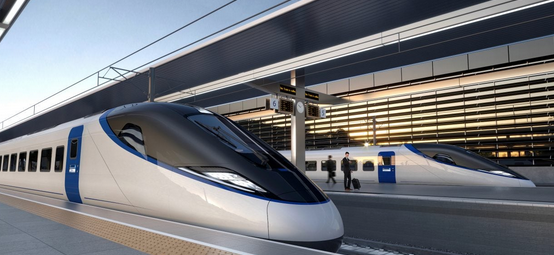The Prime Minister, in his speech to the Conservative Party Conference on 4 October, announced the truncation of the iconic HS2 rail route, originally promoted as a means of levelling up the regions beyond London by halving journey time between city centres. The intention is now for high speed trains to run only between Euston and Birmingham, reverting to lower speeds on existing track to further destinations.
The economic case for HS2 was always problematic. It got worse as costs rose. The initial cost of the full Y network, comprising both the legs to Manchester and to Leeds, was put at £37 billion (2009 prices), but by the time of publication of the Full Business Case in 2020, this had risen to £109 billion (2015 prices), with further cost escalation in prospect due to inflation and real cost increases as earlier optimism bias became exposed. In July 2023 the Infrastructure and Projects Authority gave the project a red rating, meaning that successful delivery appears to be unachievable without rescoping.
So, it is not wholly surprising that Rishi Sunak pulled the plug. Yet London’s Crossrail scheme, renamed the Elizabeth Line on opening, also overran substantially both time and budget. But once opened, the design has been widely admired and performance has surpassed expectations. So, did the Prime Minister lack the courage to adhere to the strapline on his lectern when making his announcement: ‘Long term decisions for a brighter future’?
To avoid the charge of chopping HS2 to save money, the PM announced a whole raft of alternative transport projects, ranging from a metro for Leeds to more funds to fill potholes, most of which were already planned. However, a major rail investment has been replaced in part by a miscellany of road schemes, unhelpful for achieving Net Zero but consistent with the Government’s recent downplaying of urgency of this objective. And if the expenditure profile of the aggregate of these alternatives matches that of the abandoned section of HS2, then it would be many years before their benefits are realised.
The Government established the National Infrastructure Commission in 2015 to advise it on the UK’s main infrastructure needs. The Commission is shortly to publish its second National Infrastructure Assessment outlining a strategic vision over the next thirty years. The Commission has been unsighted by the HS2 announcement, which its Chair stated to be ‘deeply disappointing’.
The truncation of the largest single transport investment, planned over many years, will not reflect favourably on the UK’s ability to execute large infrastructure schemes on which a dynamic economy depends. Nor will an announcement at a party conference of a huge switch of resources from a major strategic investment to a diversity of lesser schemes seemingly designed to spread benefits thinly where these may have greatest political advantage.
There has long been an argument that better regional rail links for cities in the Midlands and the North would be offer greater economic benefits that North-South links. But any major shift of resources deserves more extensive consideration by those affected than has occurred in the present case, where the Prime Minister has wanted to make a break with his Conservative predecessors who had endorsed HS2.

